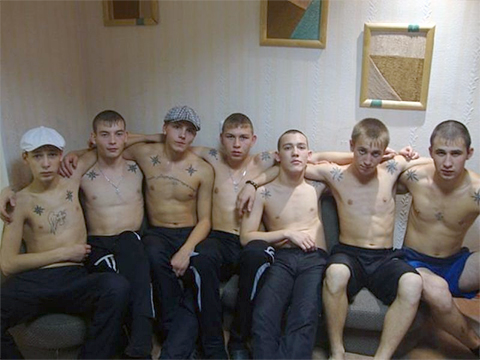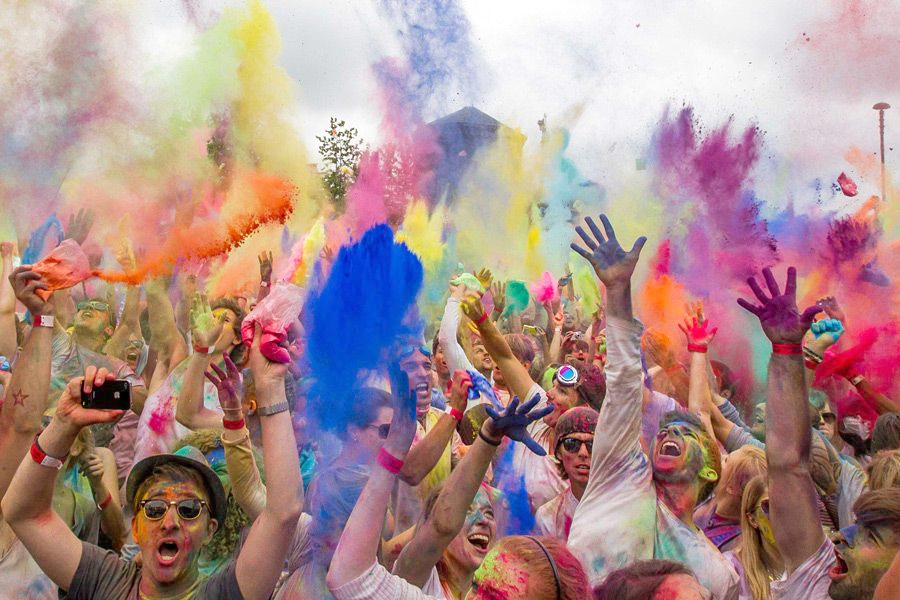Several years ago a new youth subculture appeared in Russia. In a few years it spread almost all over the country, massively introduced into schools, boarding schools, orphanages and vocational children camps. The main participants are children aged 10 to 17. The representatives of this subculture call themselves AUE, an abbreviation, hiding the combination of several Russian slang words, different by different opinions: some read it as “Prisoners’ Way of Life”, some as “Prisoners and Criminals Unity”.
The main message of the movement’s ideology is reflected in the name – it is actually a cult of prison life “concepts” and “rules”, stylized as a youth culture. It is the cult of strength, theft and parasitism.
The criminal life always was idealized in Russian folklore, especially in popular songs. But never before recreating of criminal life with its specific discipline and “morality” was becoming a base for a mass youth movement. Now, through the Internet, spreading the laws of criminal life has become easier.
Children gather in the lobbies and staircases of their buildings – they simply have nowhere to go. They paint the abbreviation of the AUE on the walls and tell each other stories about “beautiful criminal life”. Senior comrades ennoble the criminal subculture, criminal principals of “real” friendship and mutual help, tell that criminal authorities are the most decent people, they can be trusted, and the police and the state are bad. The authorities are “real” criminals, and we are Robin Hoods.
A year ago, for the first time, Russians started talking about the movement at the federal level. A gang of teenagers of the AUE had attacked a police station in the Trans-Baikal Territory (a region in Siberia).
In December 2016, Yana Lantratova, the executive secretary of the Council for the Development of Civil Society and Human Rights, told Russian President Vladimir Putin at a meeting of the Council about spreading of a criminal ideology in schools and boarding schools and called it “a national security problem”. Lantratova told the President that a lot of parents are coming to her, reporting that “their children, brought up in well-to-do families go out to schools in the morning and instead of schools they are going to special safe houses where alcohol and drugs are already prepared for them.”
Since 2016, the problem of AUE has been actively discussed in federal and regional Russian media. The journalists claim that this informal movement already has spread over all of Siberia and part of the Far East.
Svyatoslav Khromenkov, a lawyer, representative of the Baikal Human Rights Center, wrote:
“Historically, our region is ‘prisoners’ region’. In every second family we have someone who was imprisoned once or imprisoned now. Therefore, perhaps, the influence of AUE is more felt to us. But somehow it’s spread everywhere. Although, there is simply no statistical data on this matter.”
In some local schools, members of the youth groups collect “monthly taxes” from their classmates and other students. They call it a “tributes for the zone” – money is transferred to criminal bosses serving sentences in prisons. From the parents of schoolchildren to the administration of educational institutions every one knows about this, but nobody can prevent such a state of affairs.
Here is how the executive secretary of the Council for the Development of Civil Society and Human Rights Yana Lantratova describes the situation:
“It turned out that many children’s institutions, especially in the Trans-Baikal Territory, are under the influence of AUE. A prisoner jailed in the “zone”, has a phone, and he can use “watchers” to carry ut their own orders in schools, orphanages, vocational children camps and other educational institutions. And children are forced to give money to the “fund” for the zone. And if they do not surrender, they pass into the category of “lowered”, others mock them, they have separate utensils, tables. We found out that there is a multi-discipline school nearby, in which five children committed suicide in six months. The story was quietly hushed up – authorities said that these suicides did not have any relation to AUE. Although the employees themselves told us that everything is interconnected. “
On June 16, 2017 a Russian newspaper Novaya Gazeta published an article of Alexei Tarasov, who described the method the a child is “recruited into the AUE”:
“It looks like this: two high school students come up to the fifth or sixth grader and start talking to him on ‘thieves’ slang. They talk about ‘concepts’, ‘rules’ and ‘beauty’ of prison life. And then they ask to bring money for the ‘fund’. So 10-year-old child begins to steal, extort money and deceive parents.”
According to Tarasov, it is impossible to get out of this “suddenly opened abyss”. It is driving teenagers to rape by older members and suicide. Tarasov cites information about cases of teenage violence against their peers, revenge for behavior “not consistent with concepts”.
In some instances the law enforcement agencies themselves almost are becoming victims of aggressive teenagers. For example in Chelyabinsk (a city with a population of a million), on May 27, 2017, a violent accident happened during the paint festival, an annual national Russian celebration sponsored by Holi Paint Factory, when children paint each other with paint distributed by Holi. In Chelyabinsk the festival took place on one of the central streets.
A crowd of distraught children aged 13-16 years, attacked a police car arriving to ensure order at the event. They doused the official car with paint, kicked the car, and shouted insults at law enforcement officers, forcing them to leave the festival. All this was accompanied by joyful shouts of “AUE!”
In lesser settlements in Siberia and Far East, the police precincts are usually very small and it is beyond their power to resist the enraged crowd of teenagers without the use of weapons.
The “feats” of juvenile criminals rarely reach courts, since few people dare to report on them. For a schoolboy to go against the AUE and give any testimony in court means to go against all his friends and classmates, thus to become a despised derelict in their society. In some cases, their parents come to help the children. But even adult men cannot find a legal approach to the youth aggression. Thus, in the village of Novopavlovka in the Chita region, angry parents committed brutal lynching of schoolchildren who collected tributes to the AUE from their own children.
Sergei Miliukov, a professor of Criminal Law Department of the St. Petersburg University, a retired colonel of police, said in his interview to a popular Medusa website:
“Some statistics. During the first three months of 2017, Russia managed to identify only about ten thousand juvenile offenders, which is extremely small figure. I think only in one district of St. Petersburg one can find more juvenile criminals. At the same time, if we compare this indicator with the official figures of previous year, there was a fall in the registration of juvenile delinquency by 23.2%. We all see what is really happening in the country, but according to official statistics, juvenile delinquency has disappeared. We have 24 educational colonies, which contains only 1,649 juvenile offenders. In my opinion, this is one of the reasons why this infection now blooms and smells: no one is fighting it.”
In January 2017, Putin ordered the creation of an interdepartmental working group with the participation of law enforcement agencies and members of the HRC to prevent the criminalization of the teenage environment. And the Russian Orthodox Church proposed to ban all groups in social networks, which present and promote idealization of criminal life.
Still nothing seems to be done and the subject is actively discussed in Russia lately. Many commentators stress the fact that while in the big cities, like Moscow and St. Petersburg, young generation makes its presence known mostly by participating in political demonstrations, in the rest of the country the new generation’s activity often takes the criminal form.
Here is one of the most typical comments. Alexander Aigistov, President of the Russian National Union of Non-Profit Organizations, wrote in Facebook:
“It is really scary: AUE is not just a local sect – its ideology, which has already spread its tentacles throughout Russia. Today AUE is a whole generation that will soon enter the adult age without education, upbringing, and any humanitarian values.”



